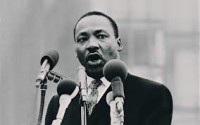
By CAROLINE BEATRICE
February is Black History month, a time to recognize the history and hardships African-Americans have experienced, and legacy of influential leaders who contribute to the fight for equality in American society.
Honoring Black history is bigger than just one month: each influential leader is recognized each day, and the people are striving for more equality that is to come.
Martin Luther King Jr. is arguably the most famous leader of the Civil Rights struggle. By peacefully prot esting the idea of judging not by skin color, but by what people bring to the table, he was able to bring about a change to better society.
esting the idea of judging not by skin color, but by what people bring to the table, he was able to bring about a change to better society.
“We did not hesitate to call our movement an army. But it was a special army, with no supplies but its sincerity, no uniform but its determination, no arsenal except its faith, no currency but its conscience,” said by Martin Luther King Jr. in his book Why We Can’t Wait.
Without King’s perseverance, the Civil Rights movement could have gone entirely different, and the rights of African-Americans would be in question.
Famous African American Leaders
Among Martin Luther King Jr., there were other influential leaders who are honored throughout Black History Month, including: Rosa Parks, Jackie Robinson, Thurgood Marshall, Sojourner Truth and Barack Obama. Each proved African-Americans are capable of doing anything that anyone else can do. By combining protests, intelligence, and power, each exuded courage in advocating for equality.
Rosa Parks, known as the “mother of civil rights” is widely known for her bus boycott, where she refused to give up her seat to a white man on a Montgomery, Alabama city bus in 1955. Her outstanding courage and strong efforts to end segregation are a pertinent part of history that needs to be honored.
Black Lives Matter, founded by Alicia Garza, Patrisse Cullors and Opal Tometi is a movement that surged following the controversial trial of George Zimmerman, who was acquitted in the fatal shooting Florida teen Trayvon Martin. Those involved are honored not only during February, but each day as they are fighting to bring awareness to evident racism. The goal of the movement is to bring attention to the inequality that African-Americans face, and to protest the violence and racism they face each day.
“It is an injustice to not honor what African-Americans have done for us,” junior Nicole Bevacqua says. “Different skin colors should not define who we are and equality is essential.”
Listen to Math major, Nicole Bevacqua, give her opinion on why Black History Month is important to celebrate:
February 26, the Smithsonian will be sponsoring a free event where “the U.S. Army Band, Pershing’s Own, in a performance of chamber music works by esteemed African American classical music composers including H. Leslie Adams, Valerie Coleman, David Sanford, Alvin Singleton, and William Grant Still. The 90-minute concert, with intermission, will be followed by a Smithsonian-moderated discussion, and end with audience Q&A” to honor culture and music brought about by African-Americans.
The only thing I’d want to know more about is if there are any other events going on locally like the one at the Smithsonian to celebrate and honor black history month.